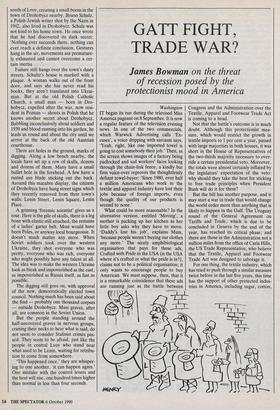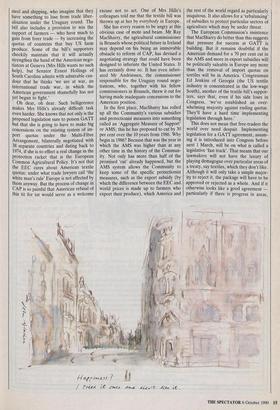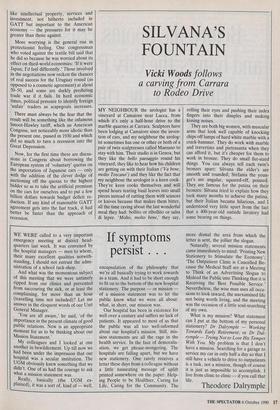GATT FIGHT, TRADE WAR?
James Bowman on the threat
of recession posed by the protectionist mood in America
Washington IT began its run during the televised Miss America pageant on 8 September. It is now a regular feature of the television evening news. In one of the two commercials, which Warwick Advertising calls 'Ex- cuses', a voice dripping with sarcasm says, 'Yeah, right, like one imported towel is going to cost somebody their job.' Then, as the screen shows images of a factory being padlocked and sad workers' faces looking through the chain-link fence, a kindly but firm voice-over reproves the thoughtlessly defiant towel-buyer: 'Since 1980, over half a million Americans who work in the textile and apparel industry have lost their jobs because of foreign imports, even though the quality of our products is second to none.'
What could be more reasonable? In the alternative version, entitled 'Moving', a mother is packing up her kitchen as her little boy asks why they have to move. 'Daddy's lost his job', explains Mum, 'because people weren't buying our clothes any more.' The nicely amphibiological organisation that pays for these ads, Crafted with Pride in the USA (is the USA where it's crafted or what the pride is in?), claims not to be a political organisation; it only wants to encourage people to buy American. We must suppose, then, that it is a remarkable coincidence that these ads are running just as the battle between Congress and the Administration over the Textile, Apparel and Footwear Trade Act is coming to a head.
Not that the battle's outcome is in much doubt. Although this protectionist mea- sure, which would restrict the growth in textile imports to 1 per cent a year, passed with large majorities in both houses, it was short in the House of Representatives of the two-thirds majority necessary to over- ride a certain presidential veto. Moreover, the totals were almost certainly inflated by the legislators' expectation of the veto: why should they take the heat for sticking to free trade principles when President Bush will do it for them?
But the bill has another purpose, and it may start a war in trade that would change the world order more than anything that is likely to happen in the Gulf. The Uruguay round of the General Agreement on Tariffs and Trade, which is due to be concluded in Geneva by the end of the year, has reached its critical phase, and there are those in the Administration not a million miles from the office of Carla Hills, the US Trade Representative, who believe that the Textile, Apparel and Footwear Trade Act was designed to sabotage it.
For one thing, the textile industry, which has tried to push through a similar measure twice before in the last five years, this time has the support of other protected indus- tries in America, including sugar, cotton, steel and shipping, who imagine that they have something to lose from trade liber- alisation under the Uruguay round. The bill also includes a provision to win the support of farmers — who have much to gain from freer trade — by increasing the quotas of countries that buy US farm produce. Some of the bill's supporters cheekily maintain that it will actually strengthen the hand of the American nego- tiators at Geneva (Mrs Hills wants no such help), but Senator Ernest Hollings of South Carolina admits with admirable can- dour that he thinks 'we are at war, an international trade war, in which the American government shamefully has not yet begun to fight.'
Oh dear, oh dear. Such belligerence makes Mrs Hills's already difficult task even harder. She knows that not only is the proposed legislation sure to poison GATT but that she is going to have to make big concessions on the existing system of im- port quotas under the Multi-Fibre Arrangement, bilaterally negotiated with 38 separate countries and dating back to 1974, if she is to effect a real change in the protection racket that is the European Common Agricultural Policy. It's not that the EEC cares about American textile quotas: under what trade lawyers call 'the white man's rule' Europe is not affected by them anyway. But the process of change in CAP is so painful that American refusal of this tit for tat would serve as a welcome excuse not to act. One of Mrs Hills's colleagues told me that the textile bill was thrown up at her by everybody in Europe.
She has every reason to be angry at this obvious case of mote and beam. Mr Ray MacSharry, the agricultural commissioner in Brussels whose political future in Ireland may depend on his being an immovable obstacle to reform of CAP, has devised a negotiating strategy that could have been designed to infuriate the United States. It has certainly done so. It has even infuri- ated Mr Andriessen, the commissioner responsible for the Uruguay round nego- tiations, who, together with his fellow commissioners in Brussels, threw it out for having made inadequate concessions to the American position.
In the first place, MacSharry has rolled up all the Community's various subsidies and protectionist measures into something called an 'Aggregate Measure of Support' or AMS; this he has proposed to cut by 30 per cent over the 10 years from 1986. Why begin in 1986? Because that was the year in which the AMS was higher than at any other time in the history of the Commun- ity. Not only has more than half of the promised 'cut' already happened, but the AMS system allows the Community to keep some of the specific protectionist measures, such as the export subsidy (by which the difference between the EEC and world prices is made up to farmers who export their produce), which America and the rest of the world regard as particularly iniquitous. It also allows for a 'rebalancing' of subsidies to protect particular sectors of agriculture which may be under threat.
The European Commission's insistence that MacSharry do better than this suggests that pressure for success at GATT is building. But it remains doubtful if the American demand for a 70 per cent cut in the AMS and more in export subsidies will be politically saleable in Europe any more than the removal of import quotas on textiles will be in America. Congressman Ed Jenkins of Georgia (the US textile industry is concentrated in the low-wage South), another of the textile bill's suppor- ters, says that, even if his side loses in Congress, 'we've established an over- whelming majority against ending quotas. They'll have a hard time implementing legislation through here.'
This does not mean that free-traders the world over need despair. Implementing legislation for a GATT' agreement, assum- ing it is introduced into Congress before next 1 March, will be on what is called a legislative 'fast track'. That means that our lawmakers will not have the luxury of playing demagogue over particular areas of a treaty, say textiles, which they don't like. Although it will only take a simple major- ity to reject it, the package will have to be approved or rejected as a whole. And if it otherwise looks like a good agreement — particularly if there is progress in areas, like intellectual property, services and investment, not hitherto included in GATT but important to the American economy — the pressures for it may be greater than those against.
More worrying is the general rise in protectionist feeling. One congressman who voted against the textile bill said that he did so because he was worried about its effect on third-world economies: 'If it were Japan, I'd feel differently.' Those involved in the negotiations now reckon the chances of real success for the Uruguay round (as opposed to a cosmetic agreement) at about 50-50, and some are darkly predicting trade war if it fails. In hard economic times, political pressure to identify foreign 'unfair' traders as scapegoats increases.
' There must always be the fear that the result will be something like the infamous Smoot-Hawley tariff, which an American Congress, not noticeably more idiotic than the present one, passed in 1930 and which did so much to turn a recession into the Great Depression.
Now, for the first time there are discus- sions in Congress about borrowing the European system of 'voluntary' quotas on the importation of Japanese cars — only with the addition of the clever dodge of auctioning off the quotas to the highest bidder so as to take the artificial premium on the cars for ourselves and to put a few billion dollars towards budget deficit re- duction. If any kind of reasonable GATT agreement gets into the fast track, it had better be faster than the approach of recession.




















































 Previous page
Previous page